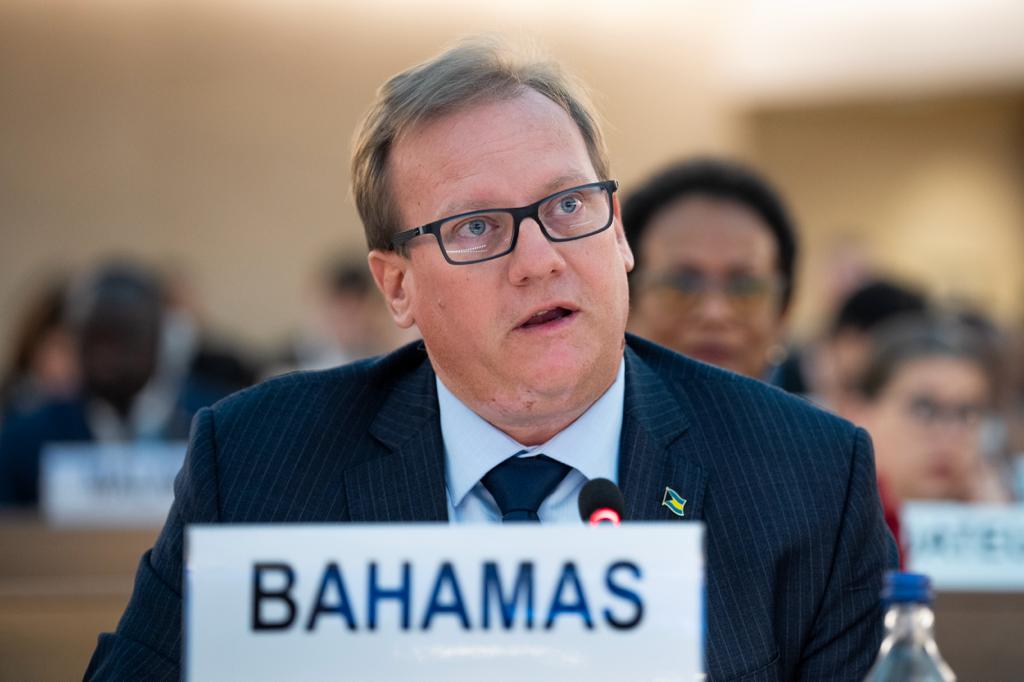Watch Attorney General Pinder’s Presentation to the United Nations
Geneva, Switzerland, Palais des Nations. The Commonwealth of The Bahamas, represented by Senator The Honourable L. Ryan Pinder K.C., Attorney General, and Minister of Legal Affairs, took a significant step in addressing the nexus between human rights and the existential challenge of climate change at the Human Rights 75 High-level event in Geneva, Switzerland on Tuesday, December 12, 2023.
Serving as a panelist on a high-level roundtable on human rights and the environment, chaired by H.E. Ms. X, Prime Minister of Iceland, the Attorney-General underscored the responsibility of affected States, private industry, and industrialised nations, while emphasising the unique challenges faced by vulnerable nations such as The Bahamas. As an archipelagic and low-lying small island developing state (SIDS) and a big ocean country, The Bahamas is particularly exposed to the adverse effects of climate change, posing a material threat to non-negotiable human rights.
The Attorney-General transmitted the message to the international community that The Bahamas firmly believes in the principle that the polluter must pay for the negative impacts of their actions on the climate. To effectively address this, the country has promulgated legislative measures, including the Environmental Administration Fund, ensuring that fees and fines from environmental crimes benefit affected communities and enhance the nation’s capacity to respond to future environmental challenges.
Minister Pinder highlighted the fundamental principle that the benefits of climate justice must directly accrue to the people. The Bahamas is taking proactive measures, committing to developing an insurance product funded by liabilities from private industry and industrialised states. This initiative aims not only to achieve climate justice but also to ensure that its reparations directly benefit the most vulnerable populations impacted by the climate crisis.
You can watch the full video here:
Transcript
The Future of Human Rights, the Environment and Climate: Advancing the right to a healthy environment, including a safe and stable climate for all.
Access to justice and accountability for environmental harm
Presented by
Senator The Honourable L. Ryan Pinder K.C.
Attorney General and Minister of Legal Affairs on Tuesday 12th December 2023
Geneva, Switzerland
Roundtable Question:
What in your view can help those whose human rights have been violated as a result of environmental degradation, to access to remedy and reparation or compensation?
Response:
I wish to address this question in three parts: firstly, the responsibility of affected States, secondly that of private industry and thirdly that of industrialized nations and the largest emitting countries.
The Bahamas is a small island developing state, but also a Big Ocean country, an archipelago of over 700 islands and cays. These characteristics result in significant exposure to the effects of climate change, causing a material threat to our people’s basic human rights, including a right to a healthy environment; right to life; right to development; right to water, and right to self-determination. The Bahamas holds the philosophy that the polluter must pay for the adverse impact of their actions on the climate.
Vulnerable people do not have a means to pursue recourse for the breaches of their human rights and tangible losses incurred because of climate change. Climate Justice requires that vulnerable populations, who have historically contributed the least to the unfolding climate calamity and who are disproportionately affected, have access to justice and be compensated for their loss. The governments of vulnerable countries are therefore obligated to make climate justice representations in support and protection of their populations.
In The Bahamas, we have legislated in our Environmental Planning and Protection Act, the concept that the polluter must pay. An important component of this regime is the creation of the Environmental Administration Fund which ensures that fees and fines collected because of environmental crimes, will go to benefit communities impacted and build the country’s capacity to respond to and prevent crimes in the future.
Private industry should be held liable for their continuous and direct contribution to the generation of greenhouse gasses that cause climate change and whose effects have directly and adversely affected countries like The Bahamas. Our tangible losses are enormous, impacted by rising sea levels and rising ocean temperatures.
We also believe industrialized countries owe an obligation to vulnerable, non-emitting states for their contribution to the climate crisis. The Bahamas supports the United Nations (UN) Resolution requesting an advisory opinion from the International Court of Justice (ICJ) on the obligations of States in respect of climate change. We view the Resolution as a significant milestone in our decades-long struggle for climate justice. The Bahamas will be submitting a written statement in support of the advisory opinion calling for differentiated responsibilities based on proportional contribution to global greenhouse gas emissions.
The fundamental basis of a sovereign’s advocacy on the effects of climate change on its vulnerable population is that the benefits must accrue to the people. I mentioned the Environmental Administration Fund under our domestic law. We also believe obligations of private industry and polluting states should contribute to schemes for the direct benefit of those whose human rights have been violated.
The Bahamas is taking a proactive approach. The effects of the climate crisis have caused for catastrophic property insurance to either be unavailable or beyond the reach of many in The Bahamas. The Bahamas has therefore committed to develop an insurance product that will be funded from the aforementioned liabilities of private industry and industrialized states. We are therefore not only fighting to achieve climate justice but also working to ensure that its reparations accrue to the benefit of the most vulnerable.

